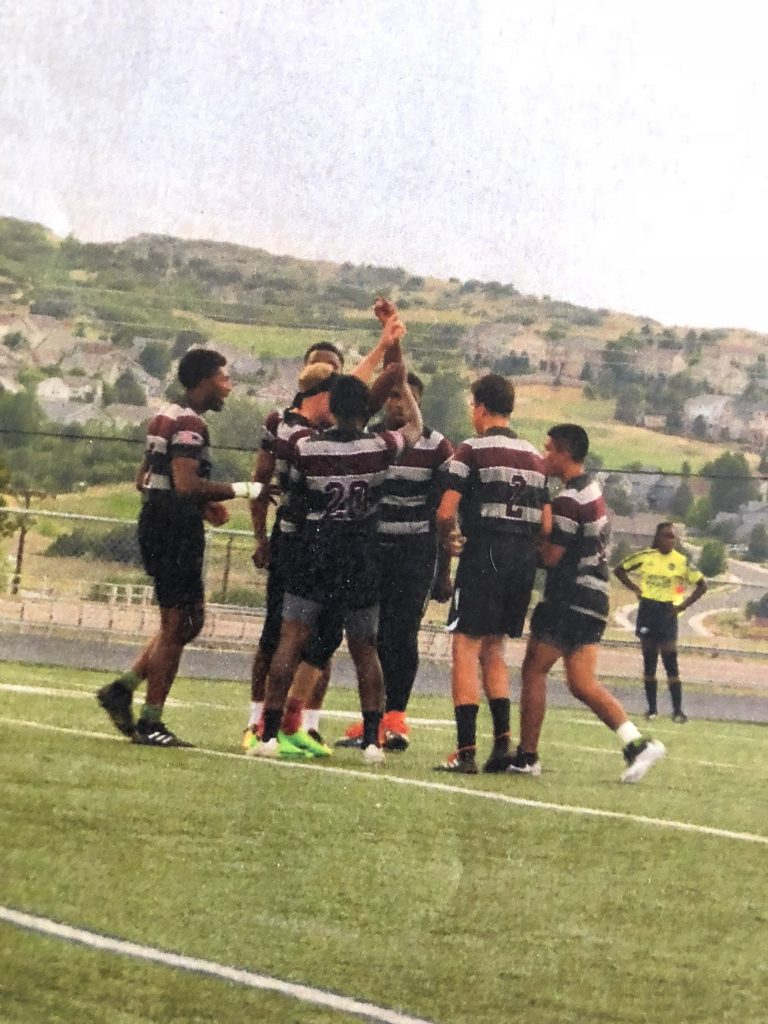Photo illustration by Nicole Sroka
Sam Roumph was supposed to be suiting up in an orange and black uniform his senior year for the Sterling Tigers, the defending state champions and No. 1 ranked high school basketball team in Colorado’s 3A division.
Instead, he sported maroon and silver for the opposing Ridge View Academy Rams, the lowest-ranked team facing the Tigers in the first round of the playoffs.
Not only did Roumph play on his old home court against his former teammates, but he was playing for “the jail school” team, composed of juvenile offenders.
“You showed up and you were the jailhouse team,” Roumph said. “Everybody knew it.”
Roumph was arrested as a juvenile for an auto accident involving injury, and spent two years at Ridge View Academy, an all-male correctional school in Watkins, Colorado.
The facility resembles a typical high school with 12 state-sanctioned sports teams, of which Roumph played for five: soccer, football, rugby, basketball and track.
Roumph was determined to make the most of his junior and senior year in high school, even if it was while he was incarcerated.
“You’re not putting your life on pause, you’re not going into a cell every day and just wasting your time, just wasting two years of your life,” Roumph said. “You grow academically, physically, mentally, spiritually.”

Jonathan Spencer, Roumph’s former coach at Ridge View, recalled first meeting Roumph at basketball practice.
“I thought he was a little knucklehead, he’s a cocky little dude,” Spencer said, laughing. “He’s still that kid for sure, his confidence probably walks in the room before he does, but he has other things that make him great also. He was a very confident, outspoken young man.”
Roumph said he took his two-year sentence seriously, becoming a captain for several teams and teaching his teammates that “overcoming so much on the field proves to them they can do the same thing off the field.”
He also noticed changes in his teammates during his time at Ridge View.
“It was a really great opportunity to see the effect sports had on some of the students as something that makes you feel good and proud of yourself while dealing with something that drives such self-disappointment and hopelessness,” Roumph said.
Spencer said that Ridge View, opened in 2001 by the national company Rite of Passage, is one of the only facilities in Colorado that allows offenders to play on organized sports teams and have a “normalized high school experience.”
“Sports play a huge role,” Spencer said. “That gives the young men a chance to own something, take accountability, work for something.”
Thom Winter, a former coach-counselor at Ridge View, praised the facility’s rehabilitative approach that emphasizes “evidence-based therapeutic and educational programs” and offers sports, extracurriculars, vocational training and job opportunities.
“It’s a huge plus for the kids, gives them a physical outlet, gives them that team bonding,” Winter said.
The bonds that Roumph built with his teammates and coaches were more than he “could count on both hands.”
“Kind of finding some confidence in yourself that you’re not just some juvenile delinquent. You can do things and you can be proud of yourself and work hard at something,” Roumph said. “You don’t have to be the kid that everybody sees you as.”

Sports are one way for incarcerated youth to receive the 60 minutes of daily exercise recommended by the U.S. Department of Health and Human Services to improve physical and mental health. They can also build confidence and self-esteem while lowering the risk for depression and suicide, according to he National Youth Sports Strategy.
However, some facilities don’t offer organized athletics, and many incarcerated youth aren’t reaching the 60-minute daily exercise mark, according to one study.
“I think the opportunity to have an outlet like sports for a lot of these young men was huge,” Spencer said.
Sports also helped Roumph when his grandfather, whom he called his dad, passed away during his sentence, Spencer said.
“Sports definitely helped him persevere through that extremely hard moment,” Spencer said. “I think if he was in a facility where there was not an opportunity for him to play sports, I think that definitely could’ve impacted him a lot different.”
His senior year, Sterling beat Ridge View and went on to win the state championship for the second year in a row, and Roumph reflected on the bittersweet game.
“It was exciting to show the new me,” Roumph said. “To come back and play them as a leader for a new team, it just made me feel like everything that I had done, everything that I had changed, was worth it.”
Spencer said he was proud of how much Roumph grew in just two short years, maturing and becoming a disciplined young man.
Now 21, Roumph is studying sports medicine at Northeastern Junior College in his hometown of Sterling.
At the beginning of his sentence, Roumph admitted he was reluctant to tell people in his former life about being on a “jail team.” But now, he hopes that sharing his experience will show others how important sports can be in incarceration.
“If somebody can make it more of a norm for athletics to be a part of the juvenile aspect of things, I think it could change the world,” Roumph said.
Source art courtesy of Sam Roumph
Lindsey Nichols, originally from Strasburg, Colorado, is a recent graduate of the University of Colorado Boulder with a bachelor’s degree in journalism and minors in business and political science. Her coverage for the CU Independent, the student news media site, has spanned local government issues and education legislation to political pieces and religious stories. She received a Hearst Journalism Award for a story about a hipster priest in Boulder. She interned for Rep. Brian Babin at the U.S. House of Representatives in Washington, D.C., for the University of Colorado Board of Regents, and with the PAC-12 Network in Boulder.


